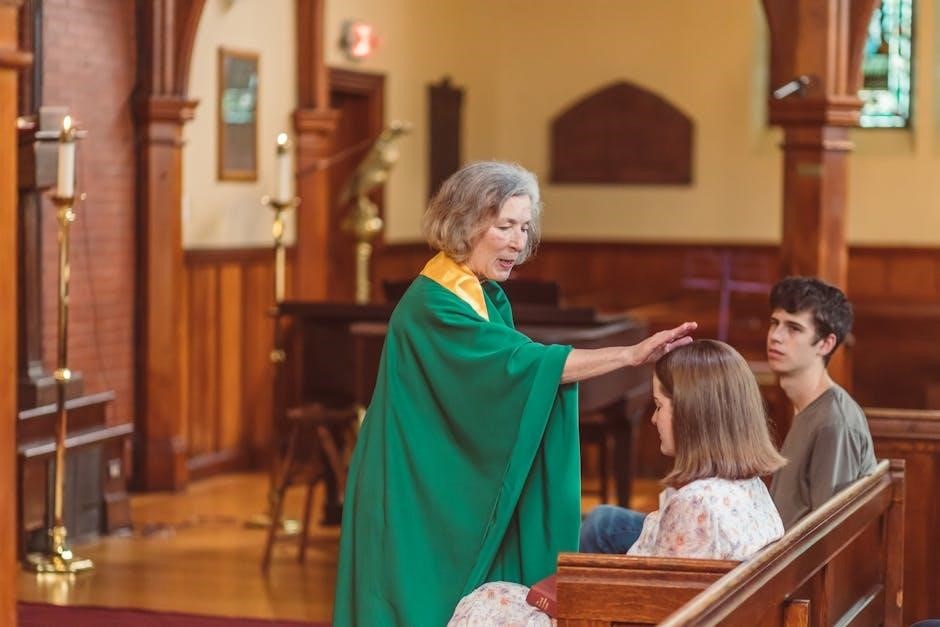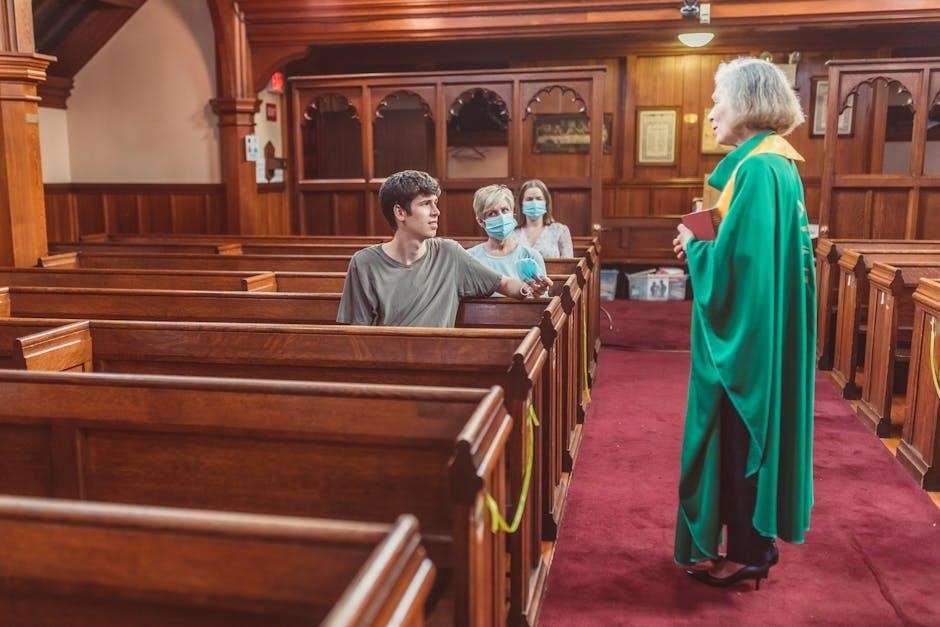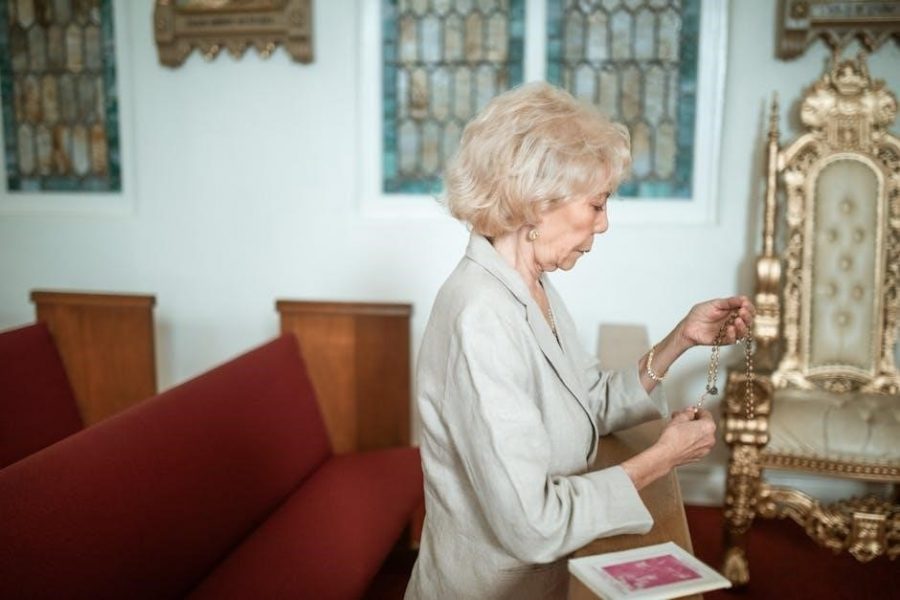Church elders are spiritual leaders chosen by God to shepherd His people, providing guidance, oversight, and wisdom. They play a vital role in church governance and spiritual growth, ensuring the congregation remains faithful to biblical teachings and principles. Elders are essential for maintaining order, resolving conflicts, and fostering unity within the church community. Their role is deeply rooted in scripture and historical church practices, making them indispensable for effective ministry and discipleship. Resources like handbooks and guides further equip elders to fulfill their calling successfully.
1.1. Definition and Role of Church Elders
Church elders are spiritual leaders entrusted with shepherding God’s flock, providing guidance, and maintaining order within the church. They serve as role models, demonstrating a deep commitment to faith and integrity. Elders are responsible for teachings, resolving conflicts, and equipping believers for ministry. Their role involves praying for the sick, offering counsel, and ensuring the church remains aligned with biblical principles. Elders are not rulers but servants, fostering unity and spiritual growth. They work collaboratively to address challenges and strengthen the congregation. Effective eldership requires wisdom, compassion, and a strong relationship with God, ensuring the church thrives as a vibrant, Spirit-led community.
1.2. Historical Context of Church Elders
The role of church elders traces back to biblical times, with roots in Jewish synagogue leadership and early Christian practices. Elders were appointed to oversee spiritual and practical matters, ensuring order and unity. The New Testament highlights their significance in guiding the church, as seen in Acts 6 and 1 Timothy. Historically, elders served as shepherds, mediating disputes and upholding doctrine. This structured leadership was essential for the church’s growth and stability. Over centuries, their role evolved, but the core purpose remained consistent: to serve as God-ordained leaders, maintaining harmony and guiding believers in faith and practice. This legacy continues to shape modern eldership.
1.3. Importance of Elders in Church Governance
Church elders are crucial for maintaining order and guiding the congregation. Their role ensures the church remains doctrinally pure and unified. By resolving conflicts and providing oversight, they help the church fulfill its mission effectively. Their leadership is essential for promoting a God-ordained structure, which is vital for the church’s integrity and growth. This structured approach ensures that the church operates smoothly, allowing it to focus on its spiritual goals and community impact. Elders play a key role in sustaining the church’s order and harmony, which are essential for its continued relevance and effectiveness in modern times, fostering a strong, united body of believers.
Biblical Foundations of Church Elders
The role of church elders is deeply rooted in scripture, with clear references in the New Testament. Elders are tasked with spiritual leadership, guiding the church according to God’s Word, ensuring doctrinal purity, and maintaining order. Biblical principles outline their qualifications and responsibilities, emphasizing wisdom, integrity, and a heart for serving others. This divine mandate provides the foundation for their authority and effectiveness in shepherding God’s people, ensuring the church remains aligned with His will and purposes.
2.1. Scriptural References to Elders
Scripture provides clear references to church elders, establishing their role in spiritual leadership. In Acts 11:30 and 1 Timothy 4:14, elders are mentioned as overseeing church affairs and teaching sound doctrine. The Bible emphasizes their qualifications in Titus 1:5-9, highlighting traits like being blameless, hospitable, and able to teach. Elders are also distinguished from other church leaders, as seen in Ephesians 4:11, where they are listed alongside pastors and teachers. These references underscore the importance of elders in maintaining doctrinal integrity and guiding the church according to God’s Word, ensuring a strong biblical foundation for their ministry and leadership.
2.2. Qualifications for Elders in the Bible
The Bible outlines specific qualifications for church elders, emphasizing moral integrity and spiritual maturity. In Titus 1:6-7, elders must be blameless, the husband of one wife, temperate, self-controlled, and hospitable. They should manage their household well (1 Timothy 3:4-5) and hold firmly to the faith. Elders must also have a good reputation with outsiders (1 Timothy 3:7) and not be lovers of money. Additionally, they should be able to teach and exhort in sound doctrine (Titus 1:9). These qualifications ensure elders are equipped to lead spiritually, maintain unity, and provide a godly example to the congregation.
2.3. Spiritual Leadership in the New Testament
In the New Testament, spiritual leadership is central to the church’s function and growth. Elders, alongside apostles and other leaders, were entrusted with guiding believers in faith and practice. Jesus modeled servant leadership, emphasizing humility and selflessness, while the apostles provided teaching, prayer, and oversight. The New Testament highlights the importance of elders being examples of godliness, demonstrating the fruits of the Spirit, and caring for the flock. Their role included resolving disputes, teaching sound doctrine, and equipping believers for ministry. This spiritual leadership fostered unity, discipleship, and maturity within the early church, setting a enduring model for eldership today.
Responsibilities of Church Elders
Church elders are responsible for providing spiritual guidance, resolving conflicts, and overseeing church operations. They ensure the congregation adheres to biblical teachings and foster unity among members.
3.1. Spiritual Guidance and Mentorship
Church elders are entrusted with providing spiritual guidance and mentorship to congregation members, helping them grow in faith and deepen their relationship with God. They offer biblical wisdom, pray for individuals, and encourage personal spiritual growth. Elders also model Christ-like behavior, fostering a culture of discipleship and accountability. By teaching scripture and facilitating meaningful prayer, such as through the ACTS Prayer Model, elders equip believers to navigate life’s challenges. Their mentorship creates a supportive environment where members can seek guidance, resolve doubts, and strengthen their faith. This holistic approach ensures the congregation remains spiritually nourished and united in their walk with Christ.
3.2. Oversight of Church Ministries
Church elders are responsible for overseeing various ministries within the church, ensuring they align with biblical principles and the church’s mission. They provide strategic direction, support, and accountability to ministry leaders, fostering an environment of collaboration and effectiveness. Elders ensure that ministries remain focused on spiritual growth, community outreach, and discipleship. They also oversee the planning and execution of worship services, educational programs, and outreach activities. By maintaining order and organization, elders help the church function smoothly, reflecting God’s desire for order in creation and redemption. Their oversight ensures resources are used efficiently and ministries impact the community meaningfully.
3.3. Conflict Resolution and Mediation
Church elders play a crucial role in resolving conflicts and mediating disputes within the congregation. They ensure issues are addressed biblically, fostering unity and maintaining harmony. Elders act as peacemakers, guiding members to resolve disagreements through prayer, understanding, and scriptural principles. Their mediation helps prevent division and strengthens relationships within the church. By addressing conflicts with wisdom and compassion, elders promote a healthy, God-honoring environment. Their role in conflict resolution is vital for preserving the church’s unity and ensuring members focus on their shared mission and spiritual growth, reflecting God’s desire for peace and reconciliation among His people.

Qualifications and Characteristics of Effective Elders
Effective elders are blameless, wise, and demonstrate integrity. They lead with humility, possess strong leadership skills, and are committed to serving others, fostering spiritual growth and unity.
4.1. Biblical Qualifications for Elders
The Bible outlines specific qualifications for elders, emphasizing moral integrity, spiritual maturity, and a blameless life. Elders must be the husband of one wife, temperate, self-controlled, and hospitable. They should demonstrate a strong faith, being able to teach and guide others effectively. The Apostle Paul provides clear criteria in 1 Timothy and Titus, highlighting the importance of being above reproach and having a good reputation. These qualifications ensure elders are capable of shepherding God’s people with wisdom, compassion, and authority, fostering a healthy and thriving church community. Their role is not only leadership but also spiritual guardianship, requiring humility and a deep commitment to serving others.
4.2. Personal Integrity and Moral Character
Personal integrity and moral character are cornerstone qualities for church elders, as they serve as role models for the congregation. Elders must demonstrate trustworthiness, transparency, and consistency in their actions and decisions. A strong moral compass guides their leadership, ensuring they act with compassion, humility, and fairness. Their lives should reflect a deep commitment to godly principles, fostering trust and respect within the church. Elders who embody these qualities create a safe and nurturing environment for spiritual growth, encouraging others to follow their example. Their moral steadfastness is vital for maintaining unity and integrity within the church body, making them effective servant-leaders.
4.3. Leadership Skills and Humility
Effective church elders must possess strong leadership skills, including strategic thinking, communication, and decision-making, while embracing humility. Humility in leadership fosters a servant-hearted approach, encouraging elders to prioritize others’ needs over personal recognition. Elders should lead by example, demonstrating a willingness to listen, learn, and grow alongside the congregation. Their leadership should be marked by wisdom, patience, and a deep reliance on God’s guidance. By balancing authority with humility, elders create an environment of trust and collaboration, enabling the church to thrive spiritually. This combination of leadership acumen and humble servanthood is essential for fulfilling their role effectively and inspiring others to follow Christ wholeheartedly.

The Election or Appointment of Church Elders
The election or appointment of church elders varies by denomination, often involving congregational votes or leadership nominations. Prayer and discernment guide the selection process, ensuring God’s will is sought in choosing qualified leaders to serve the church effectively.
5.1. Processes for Selecting Elders
The selection of church elders typically involves a structured process that includes prayer, nomination, and evaluation. Congregations often submit names of potential candidates, which are then reviewed by existing leadership or a designated committee. Candidates are assessed based on biblical qualifications, such as moral integrity, spiritual maturity, and leadership abilities. Background checks and interviews may also be conducted to ensure suitability. Some churches incorporate training programs to prepare candidates for eldership. The final decision may require a congregational vote or consensus, ensuring unity and divine guidance in the process. This method seeks to honor God’s will while ensuring the eldership remains effective and aligned with scriptural principles.
5.2. Role of the Congregation in Elder Selection
The congregation plays a vital role in the selection of church elders by actively participating in nominations, prayers, and discernment. Members are often encouraged to submit names of individuals who demonstrate biblical qualifications and a strong spiritual character. The congregation’s input ensures that potential elders are well-respected and trusted within the church community. In some traditions, the congregation may also vote on or consent to the selection of elders, fostering a sense of unity and shared responsibility. This collective involvement reflects the biblical principle of shared governance and ensures that elders are chosen with the support and confidence of the entire church body.
5.3. Training and Preparation for Eldership
Effective eldership requires intentional training and preparation to equip individuals for their spiritual and leadership responsibilities. Churches often provide resources such as handbooks, study materials, and structured prayer guides to aid in the development of future elders. Training programs may include biblical studies, leadership workshops, and practical ministry experience. Mentorship by experienced elders is also crucial, offering guidance and wisdom. Additionally, ongoing education and spiritual growth opportunities ensure elders remain equipped to address contemporary challenges. The goal is to produce servant-leaders who are spiritually mature, doctrinally sound, and capable of shepherding God’s people with integrity and compassion. This preparation is vital for effective eldership and church ministry.
Challenges Facing Church Elders
Church elders face challenges such as balancing spiritual and administrative responsibilities, adapting to modern societal changes, and maintaining unity within diverse congregations amidst cultural shifts and pressures of leadership.
6.1. Balancing Spiritual and Administrative Duties
Church elders often face the challenge of balancing spiritual responsibilities with administrative tasks. While their primary role is to provide spiritual guidance and oversight, they are also involved in managing church operations, finances, and ministries. This dual responsibility requires effective time management and prioritization. Elders must ensure they do not neglect their spiritual duties, such as prayer, teaching, and mentoring, while attending to practical needs like budgeting and organizational decisions. Striking this balance is crucial for maintaining the health and effectiveness of the church. Resources like prayer models and leadership guides can help elders navigate these demands successfully, keeping their focus on God’s mission.
6.2. Addressing Contemporary Church Issues
Church elders face numerous contemporary challenges, such as cultural shifts, technological advancements, and evolving social norms. Issues like online engagement, mental health awareness, and inclusivity require elders to adapt while remaining rooted in biblical principles. They must address these matters with sensitivity, ensuring the church remains relevant without compromising its values. Elders are tasked with guiding the congregation through these complexities, fostering unity, and providing clear spiritual direction. By staying informed and prayerful, elders can navigate modern challenges effectively, ensuring the church remains a beacon of hope and truth in an ever-changing world.
6.3. Maintaining Unity in Diverse Congregations
Maintaining unity in diverse congregations is a critical challenge for church elders. As churches grow more multicultural and multigenerational, elders must foster an environment of inclusion and understanding. This involves addressing differing opinions, cultural norms, and theological interpretations while ensuring harmony. Elders must promote unity by encouraging open dialogue, active listening, and mutual respect among members. By modeling Christ-like humility and love, elders can bridge divides and strengthen bonds within the congregation. Additionally, they must ensure that all members feel valued and heard, regardless of their background or beliefs. This requires wisdom, empathy, and a deep commitment to biblical principles of unity and reconciliation.
Resources for Church Elders
Church elders can access handbooks, guides, and study materials to enhance their leadership. Online tools, conferences, and workshops provide practical training and support for effective ministry.
7.1. Recommended Books and Study Materials
Several books and study materials are highly recommended for church elders to deepen their understanding and effectiveness in ministry. Titles such as “The Church Elder Handbook” by J. Richards and “Biblical Eldership” provide practical insights and scriptural guidance. Additionally, online resources like the ACTS Prayer Model and comprehensive guides on church governance offer structured approaches to spiritual leadership. These materials equip elders with the tools needed to address contemporary issues, foster unity, and maintain biblical integrity in their roles. They are invaluable for both new and experienced elders seeking to fulfill their calling faithfully and effectively.
7.2. Online Tools and Guides for Elders
Various online tools and guides are available to support church elders in their ministries. Websites like MinistryGrid and ChurchLeaders offer practical training courses, while platforms such as Logos Bible Software provide biblical study tools. Online communities, like forums and social media groups, enable elders to network and share insights. Additionally, resources like the ACTS Prayer Model guide elders in structured prayer practices. Many churches also utilize survey tools, such as SurveyMonkey, to gather congregational feedback. These digital resources empower elders to lead effectively, stay organized, and address contemporary challenges with wisdom and grace, enhancing their ability to serve the church faithfully.
7.3. Conferences and Workshops for Elders
Conferences and workshops are vital resources for church elders, offering targeted training and spiritual refreshment. Events like the Leadership Training Summit and Elders’ Retreat provide platforms for elders to enhance their ministry skills. These gatherings often feature renowned speakers, interactive sessions, and peer networking opportunities. Workshops may focus on topics such as conflict resolution, biblical leadership, and effective communication. Additionally, many conferences include practical sessions on addressing modern church challenges. These events not only equip elders with knowledge but also inspire them to lead with integrity and compassion. Attending such conferences fosters growth, unity, and a deeper commitment to serving God’s people effectively.

Case Studies of Effective Eldership
Case studies highlight real-life examples of successful eldership, offering insights into effective leadership strategies and their impact on church growth and community engagement. These stories inspire and guide elders in applying biblical principles to modern challenges, fostering spiritual growth and unity within congregations. By examining successful models, elders can learn valuable lessons and implement practical solutions in their own ministries. These case studies serve as powerful tools for equipping leaders and strengthening the church. They demonstrate the transformative power of faithful, compassionate, and wise eldership in action. Through these examples, elders gain both inspiration and practical wisdom.
8.1. Successful Elder-Led Church Models
Successful elder-led church models emphasize teamwork, spiritual accountability, and a clear vision. These models often feature elders working collaboratively, ensuring decisions align with biblical principles. Effective communication and transparency are key, fostering trust within the congregation. Churches with thriving elder-led systems typically prioritize discipleship, community engagement, and servant-leadership. These models also focus on empowering members for ministry, creating a culture of mutual support and spiritual growth. By balancing governance with pastoral care, successful elder-led churches cultivate unity and purpose, serving as examples of God-honoring leadership. Their impact is evident in vibrant, transformative ministries that inspire and equip believers for effective service. These models provide practical insights for elders seeking to lead faithfully.
8.2. Lessons from Historical Church Leaders
Historical church leaders offer timeless wisdom for modern elders. Figures like Augustine, Luther, Calvin, and Wesley demonstrated unwavering commitment to scripture and spiritual renewal. Their ministries highlight the importance of integrity, theological depth, and a passion for God’s people. These leaders navigated challenges such as doctrinal disputes, cultural shifts, and personal trials, providing insights into perseverance and faith. Their emphasis on prayer, humility, and servant-leadership serves as a model for elders today. By studying their lives, elders can learn to balance doctrine with compassion, lead with humility, and trust God’s sovereignty in all circumstances. These lessons remain vital for effective, God-honoring leadership in the church.
8.3. Modern Examples of Eldership in Action
Modern church elders continue to exemplify faithful leadership through innovative ministries and community engagement. Many elders today are actively involved in outreach programs, such as food banks, counseling services, and youth mentorship. They utilize technology to enhance worship experiences and connect with congregations online. Elders are also at the forefront of addressing contemporary issues like mental health and social justice, ensuring the church remains relevant and compassionate. Their dedication to prayer, discipleship, and servant-leadership inspires others to follow Christ. By blending traditional biblical values with modern approaches, these elders demonstrate how effective leadership can thrive in today’s dynamic world, glorifying God and transforming lives.
Church elders are vital spiritual leaders, guiding communities with wisdom and compassion. Their role is essential for fostering unity and growth, both now and in the future.
9.1. The Future Role of Elders in the Church
The role of church elders will continue to evolve, requiring them to balance traditional spiritual leadership with modern challenges. As the church navigates cultural shifts and technological advancements, elders must adapt while remaining rooted in biblical principles; Their ability to provide wise counsel, foster unity, and guide congregations through complex issues will be crucial. Elders will need to embrace innovation in ministry while maintaining the integrity of scripture. By equipping themselves with resources and training, they can effectively address contemporary concerns and lead the church into a future focused on discipleship and community impact. Their visionary leadership will be essential for sustaining vibrant, relevant ministries.
9.2. Encouragement for Aspiring Elders
Aspiring elders are encouraged to embrace their calling with humility and passion. Serving as an elder requires a deep commitment to spiritual growth and a willingness to shepherd others. It is vital to seek God’s will through prayer and scripture, ensuring alignment with His purpose. Cultivate qualities like wisdom, compassion, and integrity, as these are essential for effective leadership. Surround yourself with mentors and resources, such as biblical guides and church handbooks, to prepare for the responsibilities ahead. Remember, eldership is not about power but about serving God and His people faithfully. Step forward with courage, trusting in God’s grace to equip you for this sacred role.
9.3. Prayer for Church Elders and Leaders
Prayer is a cornerstone of support for church elders and leaders, ensuring they remain grounded in God’s will. Elders should seek divine wisdom and strength through prayer, trusting in God’s guidance. The congregation is also encouraged to pray for their leaders, asking for clarity, integrity, and compassion in their roles. Using prayer models like the ACTS method (Adoration, Confession, Thanksgiving, Supplication) can provide structure and depth. Prayers for elders should focus on their spiritual growth, decision-making, and ability to unify the church. Resources like prayer guides and devotional materials can further enrich their prayer life, fostering a deeper connection with God and His people.
